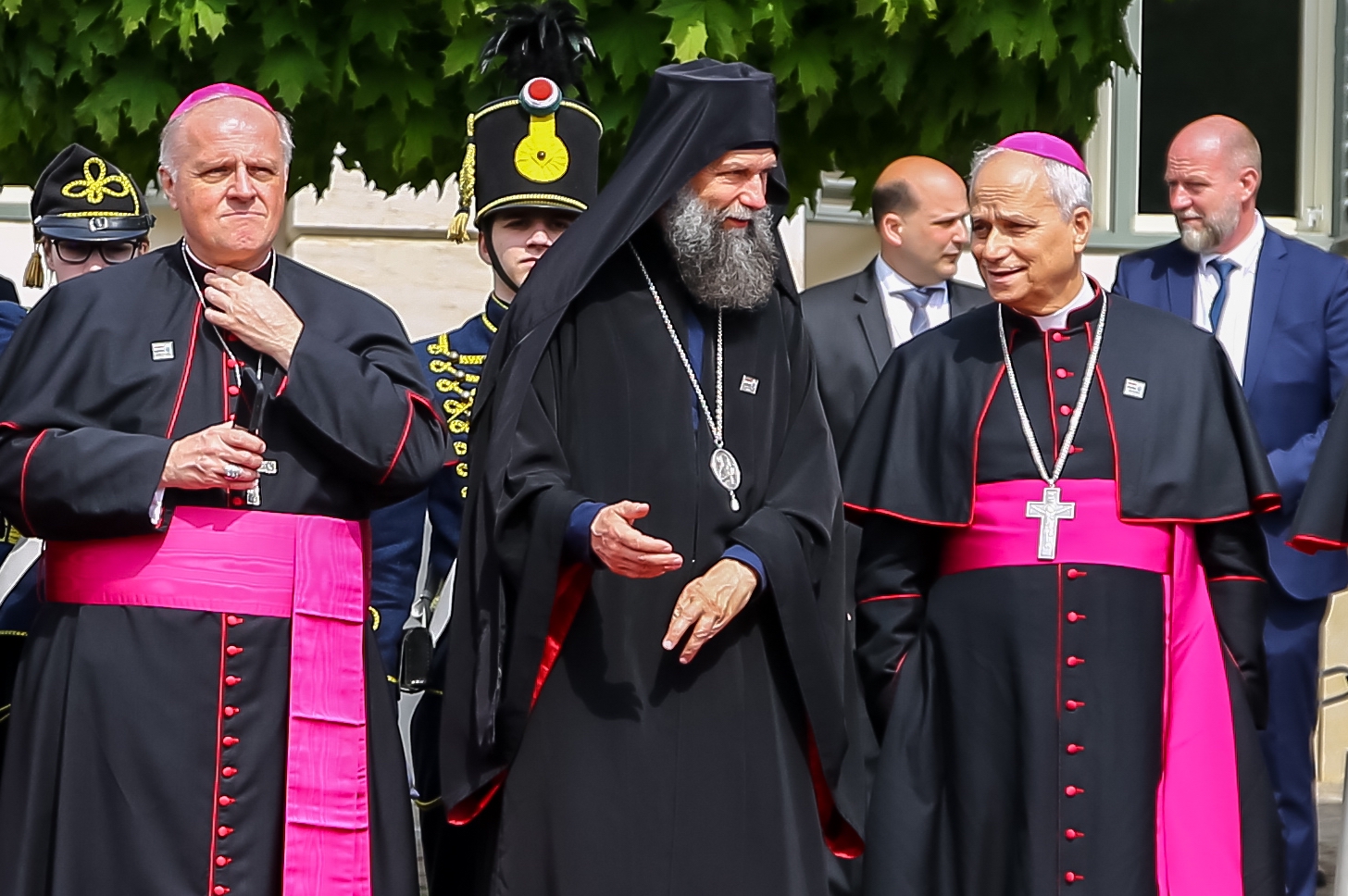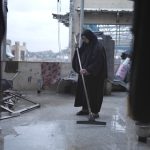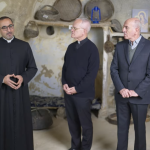CHICAGO — Church leaders in the Christian East welcomed the election of Pope Leo XIV on 8 May, noting his first words to the crowd in St. Peter’s Square were about peace.
Ecumenical Patriarch Bartholomew of Constantinople was at an event in his honor in Athens when he learned of the election, according to a report in The Orthodox Times.
In an English-language video message published by the ecumenical patriarchate, he welcomed the new bishop of Rome, adding he hopes Pope Leo will “be a dear brother and collaborator … for the rapprochement of our churches, for the unity of the whole Christian family, and for the benefit of all of humankind.”
Bartholomew spoke of his collaboration with Pope Francis in the areas dialogue and care for creation. “We have done a lot,” he said.
The ecumenical patriarch, who had hoped to visit Iznik, Turkey, with Pope Francis in May to mark the 1,700th anniversary of the First Ecumenical Council of Nicaea, said he hoped Pope Leo would “combine a visit to Nicaea with an official visit to the Ecumenical Patriarchate, on the occasion of our feast of St. Andrew on 30 November.”
“We look toward the new pontiff with Christian hope,” he told those gathered at the event in Athens, adding that he intends to attend Pope Leo’s enthronement in Rome.
“May he inspire the church and the world with the universal ideals of freedom, equality, justice and solidarity. May he help end wars in Ukraine, the Middle East, and prevent conflict between India and Pakistan,” he said. “I hope we can inaugurate a new era in our bilateral relations and in relations between East and West.”
In a message posted on the website of the Ukrainian Greek Catholic Church, Major Archbishop Sviatoslav Shevchuk of Kyiv-Halych noted that the first words Pope Leo spoke from the balcony were “Peace be with you.” He said that “suffering Ukraine hears these words as words of hope and special God’s blessing.”
“His Holiness Pope Leo XIV expressed the wish these words ‘reach all nations, all the earth.’ We sincerely believe the new bishop of Rome will become for the long-suffering Ukrainian people a herald of peace that comes from the risen Lord,” said Archbishop Shevchuk.
Metropolitan Fulop Kocsis, archbishop of Hajdudorog, Hungary, who heads the Hungarian Greek Catholic Church, also commented on the pope’s words of peace.
“Not only did he literally wish them peace, but he quoted the risen Christ, who also greeted the apostles with these words,” he said. “Of course, peace after the resurrection is quite different, since Jesus Christ gives peace in a way that is different from the way the world gives it. It is not about the laying down of arms, but about the power of Christ.”
The new pontiff had visited Hungary twice in recent years, first as bishop of Chiclayo, Peru, for the 52nd International Eucharistic Congress in Budapest in September 2021, and then as prefect of the Dicastery for Bishops in April 2023, when he accompanied Pope Francis on his apostolic visit to Hungary, which included a visit to the Greek Catholic Protection of the Mother of God Church in Budapest.
The metropolitan archbishop said the choice of the name Leo expresses the pope’s intention to “emphasize his social sensitivity, since Pope Leo XIII wrote the first encyclical on the subject in 1891, ‘Rerum Novarum,’ which was about poverty and the working class.”
Leo XIII was also the first pontiff to acknowledge the dignity of the Eastern Catholic churches within the Catholic communion with his 1894 encyclical, “Orientalium Dignitatis” (“On the Churches of the East”), he noted.
“So, the choice of the name Leo is particularly dear to us,” Archbishop Kocsis said, referring to Eastern Catholics.
While he thought the new pope would choose the name Francis II, he said he was “glad the pope dared to reach back into tradition.”
“I am convinced that Leo XIV will take the same line as Pope Francis. Dialogue and the inclusion of the poor are important to him,” Archbishop Kocsis said. “The two of them were excellent collaborators, they discussed many things together.”
In New York, Greek Orthodox Archbishop Elpidophoros of America recognized Pope Leo’s election “with fraternal esteem” and renewed the church’s “unwavering commitment to strengthening dialogue and fellowship between our churches, guided by humility, openness and mutual respect.”
“His ministry, deeply inspired by the example of Pope Francis, resonates strongly with the enduring commitment of His All Holiness Ecumenical Patriarch Bartholomew toward ecumenical dialogue, reconciliation and care for the most vulnerable among us,” he said.
Mar Joy Alappatt of the Syro-Malabar Catholic Eparchy of St. Thomas of Chicago, where Pope Leo XIV was born, said Eastern Catholics “anticipate a renewed focus on synodality, honoring liturgical identity, and engaging in genuine dialogue with our ancient practices.”
In his first message to the crowd in St. Peter’s Square after his election on 8 May, Pope Leo XIV had underlined the importance of walking as a synodal church.
Mar Alappatt said, as a cardinal, the new pontiff had served as a member of the Dicastery for the Eastern Churches since 2023, and “witnessed the beautiful unity of our universal Catholic communion between East and West.”
The bishop said the pope’s previous ministry in Peru “showcases a pastor who truly listens, walks humbly with his community, and amplifies the voices from the margins.
“His deep love for the impoverished and his presence among Indigenous populations strongly reflect the many missions led by Eastern churches around the world,” Mar Alappatt said. He noted especially the numerous pastoral and charitable works of the Syro-Malabar Catholic Church in mission territories across central and north India.
The pope’s “pastoral spirit, nurtured in Chicago and Peru, now opens pathways in the East through a welcoming and enriching approach,” he continued. “His papacy will inspire us to embrace our missionary calling with greater courage and compassion.”
The Order of St. Augustine, of which the pope entered as a friar, posted on its website an interview he gave when was elevated to cardinal in 2023. In that interview, he said “being a synodal church that knows how to listen to everyone is the way not only to live the faith personally, but also to grow in true Christian brotherhood.”
“The church is fully such only when it truly listens,” he said, “when it walks as the new people of God in its wonderful diversity, continually rediscovering its own baptismal call to contribute to the spread of the Gospel and the Kingdom of God.”
Barb Fraze contributed reporting to this article.
Republished with permission of Catholic Near East Welfare Association.




